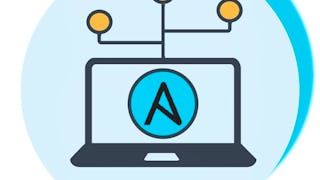Automation with Ansible is a fundamental course for deploying end-to-end automation. This course provides a secure and stable foundation for automating your environment. Ansible Automation helps organizations to create, share and manage the automation of tasks from development and operations to security and network teams.

Enjoy unlimited growth with a year of Coursera Plus for $199 (regularly $399). Save now.

(14 reviews)
Recommended experience
What you'll learn
Demonstrate working of portal that acts as a central repository for sharing, reusing and locating Ansible-related Content
Explore Ansible's components such as its ease of deployment, learning and debugging
Overview of Ansible Playbooks, which is a YAML based automation tool that developers can use to automate various tasks.
Elaborate Automation with Ansible for remote clients in order to explain Ansible inventory files
Skills you'll gain
Details to know

Add to your LinkedIn profile
9 assignments
See how employees at top companies are mastering in-demand skills

There are 3 modules in this course
Welcome to Week 1 of Automation with Ansible Course. This week's focus is on setting up a virtual machine (VM) and configuring the environment for using Ansible, an open-source automation tool. You will also learn how to install and configure Ansible, which includes configuring its settings, inventory, and modules. Additionally, you will learn about using Ansible in the cloud, including setting up and configuring Ansible for use with cloud providers such as Amazon Web Services (AWS) and Microsoft Azure. By the end of the week, you should be familiar with the basic concepts and tools needed to use Ansible for automating tasks and managing infrastructure.
What's included
13 videos1 reading3 assignments1 discussion prompt
Welcome to Week 2 of Automation with Ansible Course.This week's focus is on implementing Ansible automation with Playbooks and Ad-hoc tasks for remote clients. You will learn how to deploy Apache using a Playbook, configure Ansible to work with SSH, manage remote hosts using Playbooks and Ad-hoc tasks, and use the ansible command-line tool to run Ad-hoc tasks. By the end of the week, you should be able to automate tasks on remote hosts using Ansible, both through Playbooks and quick, one-off Ad-hoc tasks.
What's included
9 videos1 reading3 assignments
Welcome to Week 3 of Automation with Ansible Course.This week's focus is on managing variables, implementing task control, and using conditions, loops, and handlers in Ansible. You will also learn about Ansible security best practices, using Ansible Vault to encrypt sensitive data, and using Ansible Tower for managing Ansible deployments. By the end of the week, you should be able to manage variables, implement task control, use conditions, loops, and handlers, and have an understanding of Ansible security and management tools.
What's included
10 videos3 readings3 assignments
Instructor

Offered by
Explore more from Data Management
 Status: Preview
Status: Preview Status: Free Trial
Status: Free Trial Status: Free Trial
Status: Free TrialCisco Learning and Certifications
Why people choose Coursera for their career





Open new doors with Coursera Plus
Unlimited access to 10,000+ world-class courses, hands-on projects, and job-ready certificate programs - all included in your subscription
Advance your career with an online degree
Earn a degree from world-class universities - 100% online
Join over 3,400 global companies that choose Coursera for Business
Upskill your employees to excel in the digital economy
Frequently asked questions
This course is completely online, so there’s no need to show up to a classroom in person. You can access your lectures, readings, and assignments anytime and anywhere via the web or your mobile device.
If you subscribed, you get a 7-day free trial during which you can cancel at no penalty. After that, we don’t give refunds, but you can cancel your subscription at any time. See our full refund policy.
Yes. In select learning programs, you can apply for financial aid or a scholarship if you can’t afford the enrollment fee. If fin aid or scholarship is available for your learning program selection, you’ll find a link to apply on the description page.
More questions
Financial aid available,


